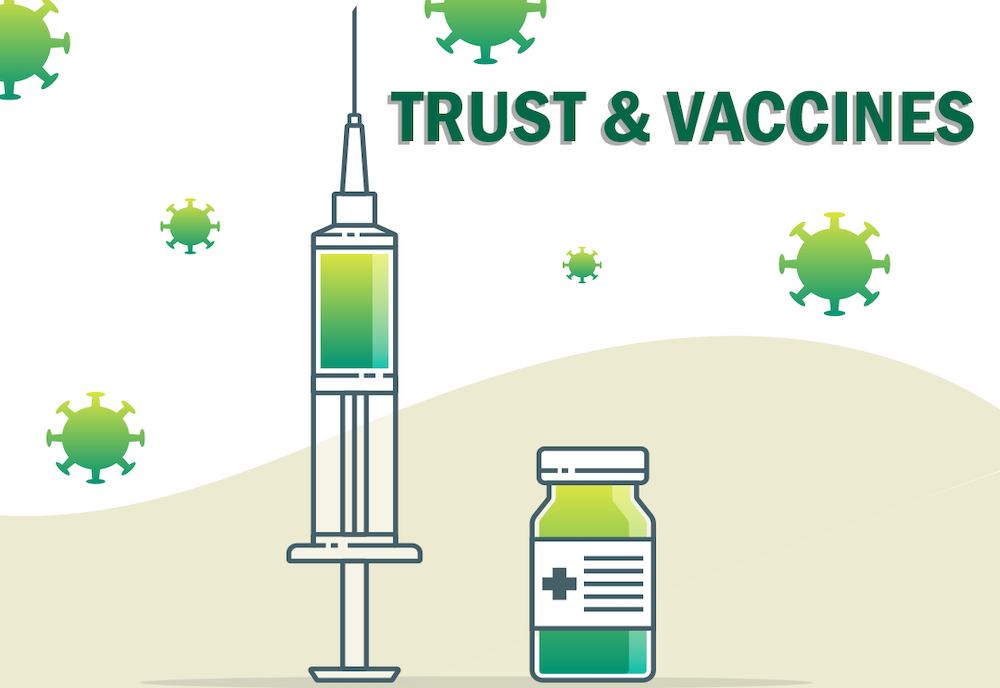More than half the population has received at least one dose of the COVID-19 vaccine. Case numbers are declining, but with nearly half of the people not yet vaccinated, it’s clear that trust is not there for many Americans.
In an online forum, Trust & Vaccines, held by the Bishop Center for Ethical Leadership at the USF Muma College of Business, a panel of experts looked at what’s motivating people to get the vaccine and why others still are not.
According to May 2021 statistics from the Keiser Family Foundation, approximately 108 million people are vaccine-hesitant. This poses a challenge for businesses struggling with return to work plans and for community leaders in areas where the pandemic has disproportionately affected minorities.
Panelist Dr. Kevin Sneed, dean of the USF Taneja College of Pharmacy, is trying to change that. He runs the USF Health program Workgroup Enhancing Community Advocacy and Research Engagement (WE-CARE), and partnered with Tampa-based organization REACHUP, Inc. to promote healthcare and educate people about COVID-19.
“When SARS-CoV-2 emerged in 2019, we were taking notice that it was a far different virus than we had ever seen before,” said Sneed.
Early on, he tried to explain the dangers of COVID-19. Unfortunately, some people weren’t taking it seriously enough.
“The notion that we were dealing with another type of flu, in the scientific and clinical community, we understood very quickly that we were not dealing with that,” he said. “We were dealing with a virus that had the potential to activate portions of the immune system in the body, and more specifically, the inflammatory system in the body that can cause a great deal of organ harm to the person that was affected.”
The misconceptions and misinformation around COVID-19 didn’t stop with the virus. It then spread to the vaccines developed to end the pandemic.
“Many people woke up and felt we walked into a kitchen on April 2020 and began making a brand-new type of vaccine platform. Nothing could be further from the truth,” Sneed said. “As a matter of fact, one of the companies started working on these medicines and RNA platforms during SARS-CoV-1.”
Severe acute respiratory syndrome (SARS) is caused by a coronavirus called SARS-CoV and was first reported in Asia in February 2003. The illness spread to two dozen countries before being contained in July 2003. Only eight cases were reported in the United States. The knowledge obtained from the vaccine development for SARS helped in the development of the COVID-19 vaccine.
Sneed believes the messaging to the public about the earlier research should have been better. Instead, people were getting inaccurate information and then sharing it with their friends and family.
Aaron Sharockman, executive director of Politifact, the nonprofit, nonpartisan website that is the largest fact-checking organization globally, says social media enables that misinformation to spread rapidly. The team at PolitiFact has investigated over 800 claims related to the coronavirus over the last 15 months and saw a disturbing pattern.
“This is the problem with social media websites that are not designed to highlight trustworthy information. They were built to keep you on their website,” said Sharockman. “If you are a person who is skeptical of the government, you will see posts that confirm that belief. It doesn’t mean it’s true, and it doesn’t mean it’s false. What it does mean is it has not been vetted for trust.”
Sharockman encourages people to take 90 seconds to investigate claims they are unsure about. He says we need to train our brains to act a little more skeptically of what we see online. PolitiFact has created a free course that helps people fact-check stories and identify credible sources and also provides answers to many of the questions about the COVID-19 vaccine.
“All the data is in; the vaccine is showing to be very safe and effective for the overwhelming majority of people,” Sneed said. “This is the information we will begin to share as part of our WE-CARE and REACHUP outreach.”
